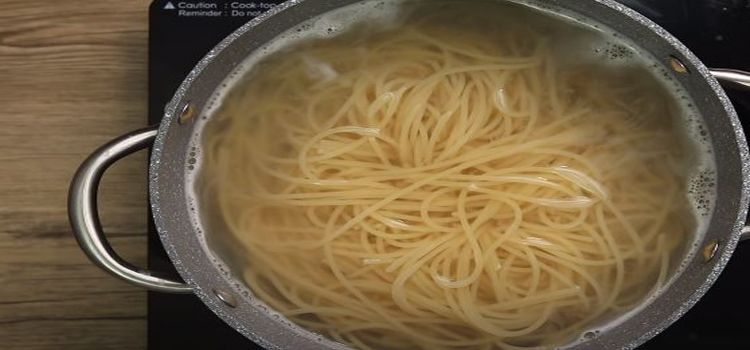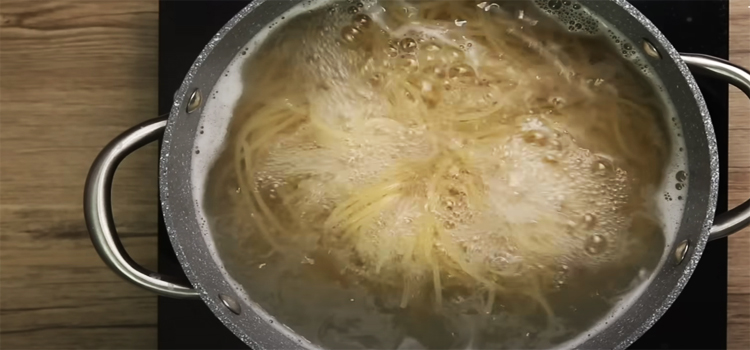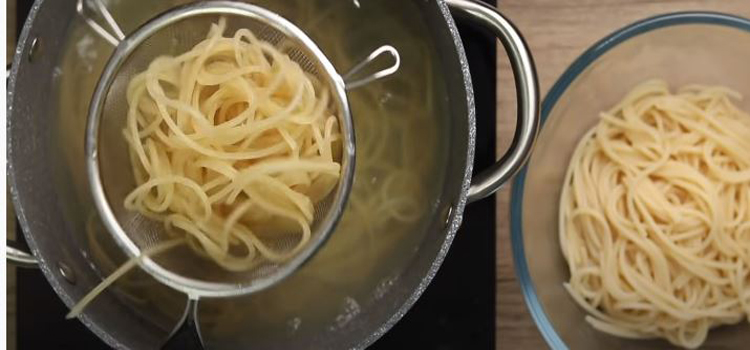Last Updated on September 15, 2024 by Shari Mason
Wondering how **restaurants prevent pasta from sticking**? For a pasta enthusiast like you, here are a few cool secrets.
Join me as I spill the beans on the simple but effective techniques that restaurants use to make sure your pasta stays perfectly separate and doesn’t turn into one big clump. Let’s dive in.
Top 5 Effective Ways Restaurants Keep Pasta From Sticking
1. Add Pasta To Boiling Water


If you put your noodles in before the water is boiling, they will become clumpy and gummy.
According to his head chef, adding pasta to boiling water lowers the heat of the water. So if your water weren’t already boiling, it’d be pretty lukewarm once you add your noodles.
So, ensure it reaches its boiling point before throwing in your pasta noodles to prevent sticking together. This way, you can get the cooked noodles smooth, al dente delight.
Read: Why Did Kraft Discontinue Chicken Noodle Dinner?
2. Keep Stirring the Pasta
I observed that when you drop the dry noodles into boiling water for the first few minutes, they’re covered in sticky starch.
The noodles will stick together if you don’t constantly stir them for the first two minutes. A constant stir will separate them so every noodle is perfectly cooked.
Read: How Long Is Baked Ziti Good For In The Fridge?
3. Add a Drop of Oil or a Knob of Butter


If your pasta cooking process involves adding salt and oil as your noodles boil, you’re doing it wrong. Yes, oil makes your pasta less sticky, but it also makes it slippery when you add sauce to it, it just slides right off.
If you intend to eat your noodles buttered or with olive oil only, feel free to add oil to the boiling water.
Pasta is the one food I can’t live without. It’s the food I eat to fuel my running.
Joe Bastianich, American Restaurateur
Alternatively, you can sprinkle a drop of oil or a knob of butter once the pasta has been drained. Fresh pasta can absorb the richness and stay moisturized without razing its matching sauce.
Read: Can You Cook Pasta In The Sauce?
4. Ensure It Has Enough Water
Using plenty of water is another key to preventing pasta from sticking together. We recommend using 1 gallon of water [1] per package (as per the executive chef) to lift away extra starch on the noodles, causing them to stick together.
Also, ensuring it has enough water on the pan provides enough space for the starch to back off from your noodles.
Chef Tip: If you’re cooking dried pasta, you can add salt to the pasta water before it boils.
5. Don’t Drain Too Long


The head chef told me to never let the pasta sit on the drainer while waiting for the sauce to be ready. It should be the other way around.
Have the sauces bowl ready first while you wait for the noodles to cook. So, once done, you can mix the two right away.
Related Posts:
- How Do Restaurants Keep Prime Ribs Warm?
- How Do Outdoor Restaurants Keep Flies Away?
- How Do Restaurants Keep Lettuce Crisp?
- How Do Restaurants Keep Mashed Potatoes Warm?
Do They Keep Cooked Pasta Submerged in Pasta Water?
Based on my observation, restaurants do not keep cooked pasta soaked in water as it can result in soggy and waterlogged noodles.
You can use the pasta water, actually, for your pasta sauce. The salty and starchy water where you cook the pasta is a great addition to the sauce. Find out how long you can keep your mac and cheese here.
Tips When Cooking The Pasta
- We suggest rinsing it with cold water if you’re not eating it right away. This removes the starchy residue, which is the primary cause of noodles sticking together.
- When you’re ready to eat the noodles, reheat them in the pot with the sauce of your choice. If you’re making pasta (cold dish pasta), this method also works (minus the reheating).
- You can add one tablespoon of olive oil to the pasta water to prevent pasta from sticking together.
- A little pasta water can add flavor, volume, and dimension to your entire dish as the sauce boils and decreases to your desired level.
FAQs
u003cstrongu003eDoes rinsing pasta keep it from sticking?u003c/strongu003e
Yes. Rinsing pasta keeps it from sticking as it lifts away the residue causing them to stick. This is especially true when you’re making spaghetti.u003cbru003eu003cbru003eIf you need to store your homemade pasta to be used later, rinsing it with cold water would be ideal.
u003cstrongu003eDoes oil prevent pasta from sticking?u003c/strongu003e
It depends. Oil can only prevent sticking when you add it to the freshly drained pasta. But adding it to the pasta water does not make a huge difference. It only floats to the top of the water.
u003cstrongu003eShould you rinse pasta with cold water after cooking?u003c/strongu003e
Yes. You can rinse pasta using cold water after cooking to stop the cooking time further. However, it will also rinse delightful starch [u003ca href=u0022https://www.medicalnewstoday.com/articles/what-is-starch#:~:text=Starch%20is%20a%20carbohydrate%20and,the%20body’s%20primary%20fuel%20source.u0022 target=u0022_blanku0022 rel=u0022noreferrer noopeneru0022u003e2u003c/au003e] that aids sauce clinging to the pasta.u003cbru003eu003cbru003eYou only need to rinse it with cold water if you need to store it for later or when you plan to make cold pasta dishes.
u003cstrongu003eDoes Gordon Ramsay put oil in pasta water?u003c/strongu003e
Yes. Gordon Ramsay adds oil with salt to the pot of pasta water. But he uses olive oil and waits for the water to boil before adding the noodles and turning them into the pot before it overcooks.
Conclusion
There are various methods that chefs and cooks use to ensure that each strand of pasta is perfectly cooked and separate, from using a large pot with plenty of water to only adding the noodles when the water is boiling.
Have a constant stir, and only add a drop of oil or butter to the pasta water. By following some of these tips and techniques, you too can achieve perfectly cooked pasta at home, just like your favorite restaurant.
Armed with this knowledge, let us embrace the artistry of pasta preparation and enjoy every delicious bite, free from the frustration of sticky strands. Happy cooking!
References:
- https://blog.prepscholar.com/how-many-glasses-in-a-gallon-of-water
- https://www.medicalnewstoday.com/articles/what-is-starch
- Can You Put an AC Unit in the Kitchen? - September 27, 2024
- What Cheese Does Olive Garden Use? Discover Their Signature - September 27, 2024
- How to Cancel a Pizza Hut Order? Quick & Easy Guide - September 24, 2024


